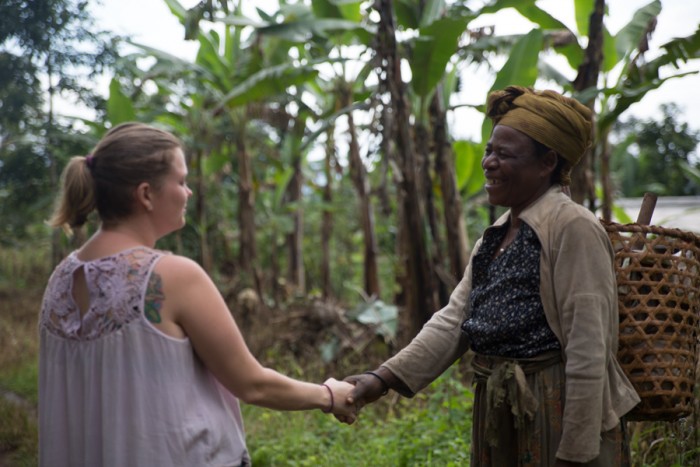September 4th, 2016 by Rachel | Tags: Peace Corps | No Comments »
People have said to me, “There are already so many problems in our home. Why can’t you just stay and help here?” Yes, while the US does have its own share of problems, and there are already Americans working to help solve issues in their home country, there are still many benefits to helping people abroad.
In the Peace Corps, volunteers are sent to far-flung places where people would have otherwise never met foreigners and learned invaluable skills. While the internet, books and television can teach people lessons, there is one thing it cannot do and that is touch people with feelings. It cannot empower people to feel that they are important to the world because they have talents and skills to offer to all.

A Peace Corps Volunteer meets a Cameroonian. By meeting each other, they learn about each other’s culture and form friendships.
By having people from two different worlds connect with each other face to face, they can learn about each others’ cultures and break stereotypes. As they teach each other about their own cuisine, their own manners, how they manage their own work places, they build friendships with each other. As result, when friendships have been formed, they contribute to creating peace. While the media only shows a small image of different places, host country nationals and volunteers can shatter stereotypes through storytelling. When volunteers go home to America, they can say, “When I lived in the country, this is what I saw through my own eyes.” Host country nationals can meet with other community members and say, “When I was friends with this volunteer, I learned that in the US, they do this.” When volunteers see positive images of their host country, they share the treasures they discovered through social media and conversing with family and friends in the US to educate them that the world is not always a horrible place. However, when they discover negativity, they not only do still share it with their fellow Americans, they also see it as a motivation to make the world a better place. Host country nationals learn the positive images through seeing how the Americans are gracious by providing them with new knowledge and skills. When Americans share their issues that exist in their homeland with the host country nationals, the host country nationals learn that Americans are not superior to anyone else in the world.
Many practical skills are also harder to teach through the internet, books and television. Examples include teaching community members how to plant vegetables, produce honey, sleep under a mosquito net, conduct science experiments, and practice speaking English. While the information may be readily available through the internet, books and television, community members may miss out on the information due to being illiterate or having limited time to watch television or read books. Examples of important information may include how to eat a well balanced diet, exclusively breastfeed, and prevent HIV transmission.
Volunteers also learn new skills abroad and bring them back home to utilize them in their home country. Examples include monitoring and evaluating progress, working with disadvantaged children, and conducting needs assessment.
